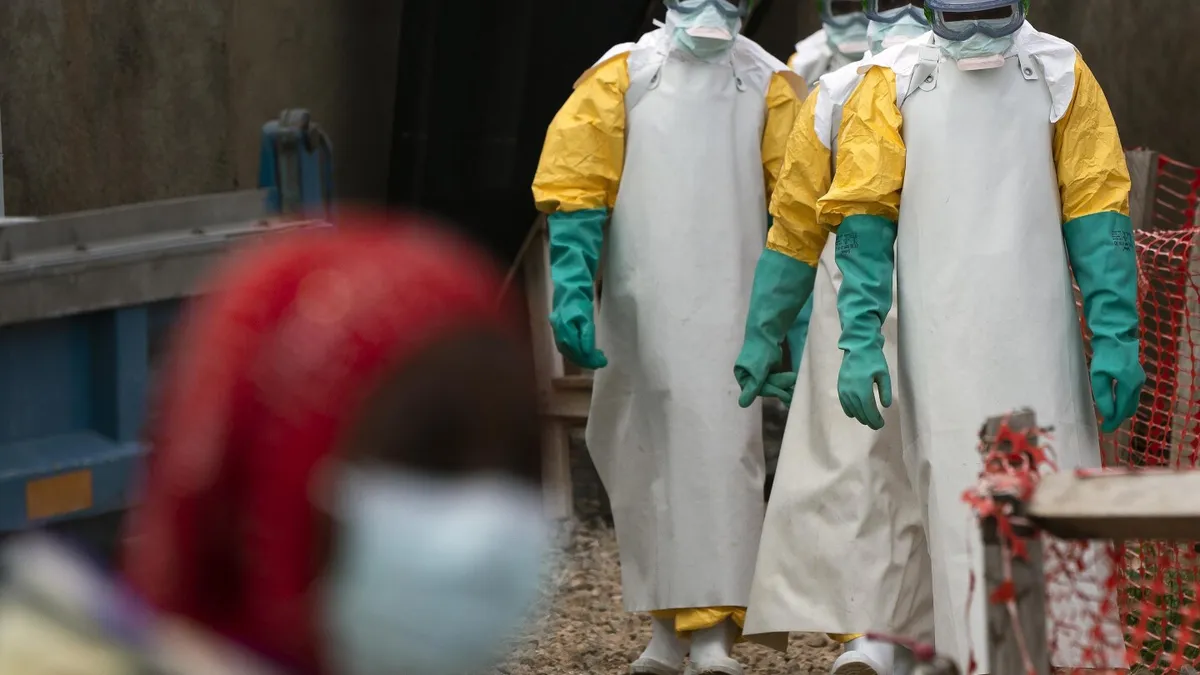
Congo’s authorities have reported a troubling new Ebola outbreak, which has already claimed the lives of more than a dozen individuals in the southern province of Kasai. The outbreak was confirmed following laboratory analysis at the National Institute for Biomedical Research in Kinshasa, the capital of Congo, which identified the presence of the highly virulent Zaire strain of the Ebola virus. This announcement comes amidst ongoing conflict in eastern Congo and a healthcare system that is already under severe strain due to cuts in U.S. aid.
The Ebola virus is known for its high contagion risk, primarily transmitted to humans from wild animals. Once in the human population, it spreads through direct contact with bodily fluids such as vomit, blood, or semen, as well as through contaminated surfaces and materials, including bedding and clothing. The disease caused by the virus is rare but can be severe and often fatal, presenting symptoms such as fever, vomiting, diarrhea, muscle pain, and sometimes both internal and external bleeding.
The initial discovery of the Ebola virus dates back to 1976 near the lake of Ebola, in what is now known as Congo. The earliest outbreaks were reported in remote villages in Central Africa, close to tropical rainforests. The latest outbreak has already resulted in over a dozen fatalities, as confirmed by Congo’s Health Ministry.
This new outbreak was officially announced after a 34-year-old pregnant woman from Boulapé in Mweka territory was hospitalized last month with symptoms indicative of hemorrhagic fever. Tragically, she succumbed to multiple organ failure just hours after admission. Since then, the outbreak is suspected to have caused at least 15 deaths among 28 individuals exhibiting symptoms, including four health workers. This marks the 16th documented outbreak of Ebola in Congo, with Health Minister Samuel-Roger Kamba stating that the estimated fatality rate is a concerning 53.6%, underscoring the severity of the situation.
The World Health Organization (WHO) has indicated that the number of confirmed cases is likely to escalate, stating, “Case numbers are likely to increase as the transmission is ongoing.” Response teams are actively working to identify individuals who may be infected and need medical attention, striving to ensure everyone is protected as swiftly as possible.
Dr. Jean Paul Mikobi, the chief medical officer of the Boulapé health zone, has raised alarms about a potential surge in infections, especially as many residents are fleeing their villages out of fear of contamination. This mass exodus complicates efforts to trace and monitor those who may fall ill. Dr. Amitié Bukidi, the head of the Mweka health zone, confirmed that all four health zones in the territory have received reports of suspected cases.
Congo has faced several outbreaks of Ebola in the past. The most recent one, which occurred in the northeastern Equateur province in 2022, resulted in six deaths. An earlier outbreak spanning from 2018 to 2020 in eastern Congo tragically claimed over 1,000 lives, marking it as one of the deadliest outbreaks since the 2014-2016 epidemic in West Africa, which resulted in more than 11,000 fatalities.
The volatile security conditions and deep-rooted community mistrust have significantly hindered efforts to control previous epidemics in eastern Congo. Health facilities, including Ebola treatment centers, have faced repeated attacks, leaving health officials in hotspots like Butembo and Katwa to manage clinics with limited resources.
In light of the outbreak, health officials are urging the population to adhere strictly to preventive measures such as social distancing and handwashing. The WHO has dispatched experts to Kasai province to enhance disease surveillance, treatment, and infection prevention within health facilities. They are also delivering essential supplies, including personal protective equipment, mobile laboratory gear, and medications.
Congo has maintained a stockpile of treatments and the Ervebo Ebola vaccine, as confirmed by the WHO. A specialized team from the National Institute of Biomedical Research has been sent to the Mweka health zone to establish a mobile laboratory for on-site patient sample testing. However, Dr. Bukidi highlighted significant challenges, stating, “The main challenges we face involve the lack of personnel and the shortage of personal protective equipment.” He added that hospitals urgently need supplies of medications and specialized equipment to combat this epidemic effectively.
In an effort to curb the spread of the virus, Francois Mingambengele, the administrator of Mweka territory, has implemented partial confinement measures, including the suspension of classes, graduation ceremonies, and the closure of weekly markets.